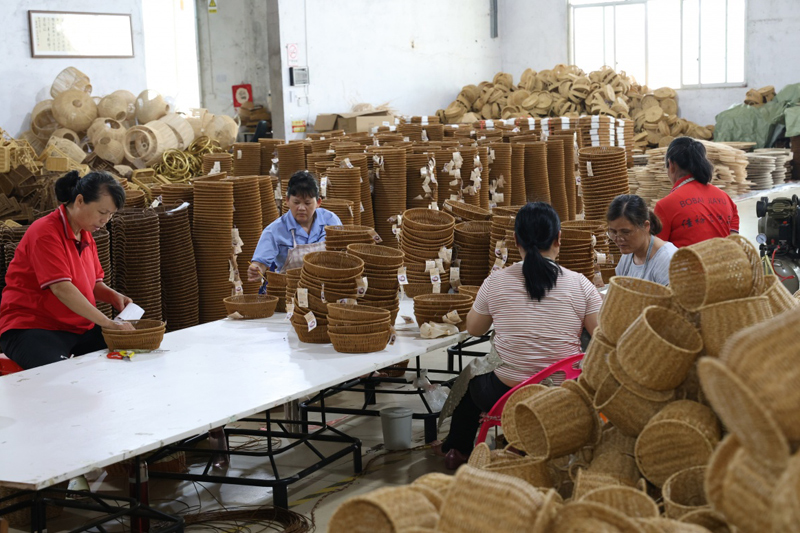Handwoven crafts go global: Rural women in S China's Guangxi weave path to better life
In Bobai, a county in Yulin city, south China's Guangxi Zhuang Autonomous Region, visitors can hardly turn a corner without seeing a pair of deft hands at work—picking, pressing, weaving, knotting.
More often than not, women of all ages are seen sitting together in a building, their hands constantly weaving as they chat about everyday family matters.
"People in Bobai are hardworking. Whenever they have spare time, they weave—to earn a bit more income," Tu Chunxiao, a successful entrepreneur who has engaged in the weaving trade in Bobai county for over 20 years, explained.

Workers make weaving artworks in Bobai county, Yulin city of south China's Guangxi Zhuang Autonomous Region. (Photo/Publicity Department of the CPC Bobai County Committee)
Over the past five decades, Bobai's traditional weaving techniques have grown from a handful of individual workshops into an industry cluster of 386 weaving enterprises. Of its around 1.9 million residents, more than 200,000 now engage in handicraft weaving.
Located in southeastern Guangxi, Bobai is known as "China's capital of handicraft weaving." Using silver grass, bamboo, rattan, straw, paper cords, wood, and even metal, local artisans create mixed-material crafts that are exported to more than 50 countries and regions around the world, including Europe, the Middle East, and Southeast Asia.
As she was interviewed, Tu was busy preparing for the 138th China Import and Export Fair (Canton Fair).
Tu said the event, slated to run from Oct. 15 to Nov. 4 this year in Guangzhou, capital of south China's Guangdong Province, helps her secure more than 90 percent of her orders.
Originally from Liuzhou city of Guangxi, Tu first came to Bobai in 2000 to visit her aunt, who ran a weaving factory. The experience of helping secure orders at a trade fair with her strong English skills remains fresh in her memory.
"The villagers were so happy," she recalled. "Some even gave me sweet potatoes and peanuts from their homes, saying they were grateful I helped them get more work."
After graduating from university, Tu decided to stay in Bobai and devote herself to weaving. Though she didn't know the craft, she learned from villagers, from online tutorials, and from overseas study tours. She even earned the title of "arts and crafts master of Yulin city."
To communicate better with local artisans—many of whom spoke Hakka rather than Mandarin—she spent a year learning the dialect.
Her first Canton Fair brought an unexpected breakthrough: over $500,000 in orders. "I never imagined our rustic 'local specialties' would be so popular abroad," she said.
Foreign buyers are fascinated by the uniqueness of the handmade products, as no two pieces are exactly the same even if they are crafted by the same person, Tu explained.
Since her first exhibition in 2009, she has participated in every Canton Fair, expanding from one booth to six, taking Bobai's craftsmanship to more than 40 countries and regions.
"This year, 65 percent of our products are new designs," she said. "In the past, customers preferred low-priced storage items. Now they are more interested in the cultural value of the intangible cultural heritage," Tu said. "We must make sure our products are practical, beautiful, and tell the story behind them."
Tu's entrepreneurial journey has not always been smooth sailing. She recalled one incident when a ship broke down and drifted at sea for two months before finally being unloaded at a different port and sent out again. On another occasion, a ship caught fire and all the cargo was destroyed.
However, a sense of mission has driven her to carry on till this day. "The orders from foreign trade are large, and I can secure more of them, giving more workers a job and a paycheck," Tu said.
Many of the artisans are middle-aged or elderly women who returned home after years of migrant work in coastal factories. For them, weaving offers both income and flexibility.
Typically, once a weaving company receives an order, it delivers raw materials such as bamboo and rattan to local farmers' households. After the farmers complete the basic weaving tasks, the company collects the pieces for further processing.
Tang Jinlan, a mother of three who weaves handicrafts between school runs and meal times, is one of the local women who benefit from the cooperative model.
As the leader of the craft in her building, Tang visited a local factory in the first half of this year, not only to learn weaving techniques, but to take more orders so her neighbors could also earn an income.
When asked if she finds the work hard, Tang said, "It's hard only when there's no work to do."
Many senior residents can earn around 1,000 yuan ($140.86) a month from weaving, according to Tu.
With that money, they can buy gifts and snacks for their grandchildren, which gives them a great sense of accomplishment, she noted.
For many rural families, a stable income from the weaving industry means a lot, according to He Yanping, deputy head of the commerce bureau of Yulin.
"A single basket can bring in a few yuan, and by weaving for a day, they can earn several dozen yuan. Many urban residents might think that's just the price of a cup of bubble tea, but for these rural families, 30 yuan—enough to buy 5 kilograms of rice at 6 yuan per kilogram—is a significant amount," He said.
Today, this local specialty industry is embracing brighter prospects and sustaining a better life for more than 200,000 local artisans, thanks to the hardworking craftspeople and entrepreneurs who have preserved and passed down the traditional craft from generation to generation.
Mo Chengzhen, one of Bobai's earliest exporters and an officially recognized representative inheritor of local silver grass and bamboo weaving techniques—an item on the list of intangible cultural heritage of Guangxi—still recalls how his father supported his entire family through handcrafted bamboo suitcases decades ago.
During the early to mid-20th century, his father carried bamboo suitcases on a shoulder pole to sell in multiple cities of Guangxi, including Nanning and Beihai, according to Mo, who is 67 years old.
When Bobai established its first foreign trade company in 1972, that same bamboo suitcases were showcased at the Canton Fair for the first time and drew massive orders, motivating the then 14-year-old Mo to join the local weaving team.
"They would take however many we made," Mo recalled.
Today, Mo's weaving business is run by his youngest son, who has blended tradition with modern design. The classic suitcases have been redesigned with fabric linings and sleek black stripes—a vintage look with a contemporary touch.
As Bobai's traditional crafts and businesses were handed down to the younger generation, its trade ties with foreign buyers have also been passed on.
When Tu attended the Canton Fair for the first time over 20 years ago, she met a young Turkish buyer who seemed like a recent college graduate. Last year, the man introduced her to his son, saying he had begun taking over the family business.
"You know, he had just started a small shop when we first met. Today, his company has grown into a very famous leading wholesaler in Türkiye," Tu said.
Boxes filled with handmade crafts from the nimble fingertips of rural women in Bobai were ready to set sail, carrying Bobai's intangible cultural heritage and story of ingenious, hardworking people to homes afar.
Photos
Related Stories
- Wickerwork industry prospers in China’s Anhui
- Mothers at looms weave tapestry of work and family
- S China's Bohai features developing weaving artwork industry
- Rattan weaving brings prosperity to people in Hanzhong, NW China's Shaanxi
- Weaving skills of Chinese ethnic minority group showcased in London
- Small town weaves big industry with various nets
- Traditional handwoven craft: xiabu
- Beauty of intangible cultural heritage in Xinjiang: Reed weaving
- A stalk of "Chinese grass" weaves its way to the world
- Girls learn traditional weaving in Rongshui, China's Guangxi
Copyright © 2025 People's Daily Online. All Rights Reserved.









